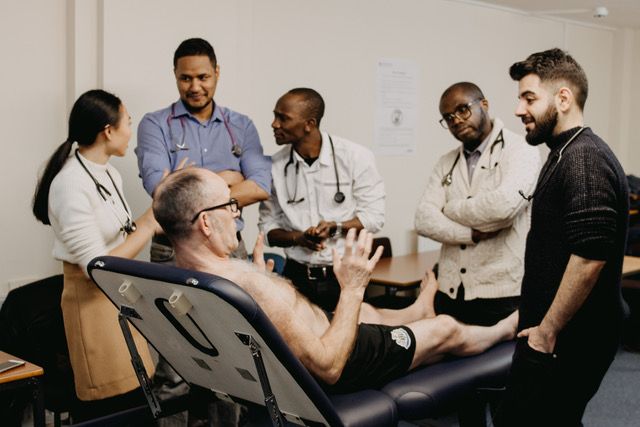
One of the greatest innovations the computer age has brought us is the opportunity for anyone to set up a podcast. Podcasts are great to watch or listen to when you are on the move and allow you to get information quickly from a variety of sources. We at Meducate have embraced that technology and are now producing a series of podcasts on Medical Roleplay and Associate Clinical Education (ACE). We will be talking to clinicians and simulated patients and, in some cases students, about their experience of working with us.

Last week I interviewed James Ennis, Clinical Director of the Physician Associate Program at Chester University, who I have had a working relationship with for over 10 years.
You can listen to the podcast here, but I thought it would be good to give a very abbreviated version as a blog post for those who don’t have the time to listen.
BOB: Welcome to the Podcast, James. First of all, thanks for coming on and agreeing to do this. I know you are very busy dealing with a multitude of challenges at the moment, but I’d like to get your view on what it’s like to work with medical role players and ACEs in this ever changing environment.
JAMES: Thanks, Bob. It’s a pleasure to talk to you about this subject and get it out to a wider audience. As you know I’ve been working with Associate Clinical Educators and role players for the best part of 10 years and we’ve always had them within our curriculum both at Birmingham University and now at Chester. I think it’s an important aspect to medical education, and the feedback we receive from students about the experience is always exceptional. I’ve never once had negative feedback from a student regarding clinical educators or role players because of their ability to help the students relax and also give them constructive feedback about both their physical examination skills and their communication skills. It’s often the case that students can feel more anxiety when working with an academic clinician than with an external educator such as an ACE.
BOB: Yes, I’ve noticed how much more relaxed the students are with us and I guess it’s because we come in at their level in many ways and with our knowledge of systems examinations we can help them practice their techniques quickly and effectively without recourse to in-depth academic analysis. It’s hands on without too much theory, which a lot of students crave.
They really enjoy the hands-on skills we help them with, and even simple techniques like palpation and percussion are keenly rehearsed with us over and over. Sometimes it’s the simplest things that can cause the most confusion and we are there to hold their hands, as it were.
I was obviously trained by Clinicians like yourself, but the students often comment on how knowledgeable we are in terms of our understanding of the examination process. We are also able to tell whether the student is gaining rapport with the patient and handling the patient in a respectful way. That and of course our extensive understanding on what is expected in OSCE’s.
As an ACE and role player, I and my colleagues must have been through 1000s of OSCE stations in our time. We have a good idea what an examiner is looking for, and this gives us a lot of credibility when students ask about OSCEs. It’s one of their big concerns, and having this knowledge helps us build trust with the students.
JAMES: Yes, I’ve noticed that when we work with you guys, you have this knack of reading the whole situation and responding appropriately. The fact that you have background knowledge of history taking and Systems Examinations, as well as a clear understanding as to what’s required in the OSCEs, has been tremendous in improving the students ability to, not just pass exams but turn out as very good, very safe clinicians. The feedback you guys give about excessive use of jargon is also important and can sometimes be missed by volunteer patients, for example.
Consulting with simulated patients when it might be called upon for them to perform intimate examinations, are made so much easier when working with an experienced ACE. That ability to help the student keep their sense of humour and deal effectively in a relaxed manner in what could be a very embarrassing situation.
Like I said you guys are an invaluable resource. I don’t know how you how you found it over the years, but I think it’s grown into something far more meaningful than we ever thought it would be.
BOB: Obviously you have embraced the idea of using ACEs as part of your teaching methodology and you find them of great value in consolidating the students learning. Yet, there are only a few institutions that utilise our skills. Chester, Wolverhampton and Birmingham are the three I know of. Why do you think ACEs have not been used elsewhere, bearing in mind the high value you place on them?
JAMES: Ultimately if we’re going to be completely honest, I think a lot of it comes down to money and resources and availability, which is a real shame, because as we know working with ACEs really embellish and enrich the student experience, and we have both alluded to the fact that ultimately students retain information and learn faster when examining real people. People who can give extensive feedback in a structured way and link that to the real world. We were even talking about getting the ACE role validated, which I know you have been a keen advocate of. That would be icing on the cake as it were.
BOB: Yes, I for one would be very keen to have the role validated. I think academics would take us more seriously and once they had experienced working with an ACE, would then realise the value and they would then add is to their program.
JAMES: Absolutely. We’ve spoken about this in the past and I think it needs to be a requirement and there is an important need to have some accreditation process or some monitoring, because it is actually a very robust system.
Academics who have not experienced working with an ACE might not be aware of the amount of training that goes into being an effective ACE, and I have seen the type of preparation ACEs go through, both as individuals and as part of the team. That’s the other aspect that needs to be mentioned. When you work with us at Chester, you really are seen as part of the team and are treated as such.
BOB: Yes, that’s true. We feel valued as much as other external educators, and we do appreciate it. It makes for a smooth working relationship and I think the students notice this too.
The recent Pandemic must have posed challenges for you as an educator and I know it has affected the amount of work we have had. Some Institutions were up and running, but most seemed to struggle with embracing the new idea of working online. What was your experience like?
JAMES: Yeah, that’s a good question, actually. Obviously, we have had to change our approach to clinical practise and there have been significant changes in general practise in the community. We have had to work with video conferencing, telephone triage and consultations and we have found new ways to use these technologies with you guys at Meducate.
In fact, you were up and running as soon as the lockdown happened. This was great news for us, as we could use your services almost immediately and the skill and depth of understanding you brought to this new way of working was refreshing. Everything ran like clockwork. I can only say thanks and say that for those reading this Meducate can provide you with an excellent and very professional service.
***
I would like to thank James for giving permission to abbreviate our podcast and in future posts will include more interviews with clinicians as well as ACEs and students.